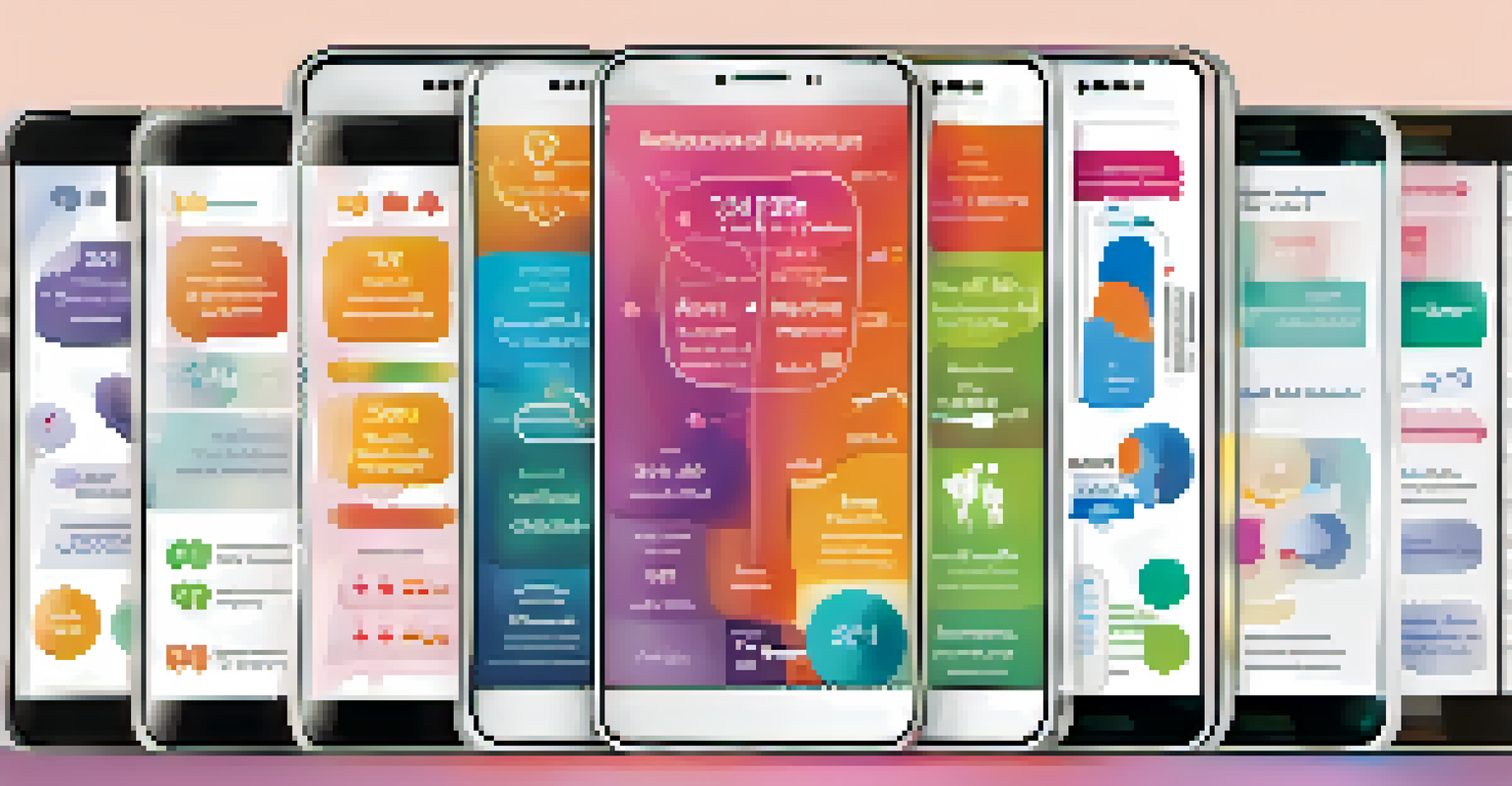Digital Therapeutics: Evidence-Based Treatment Solutions

What Are Digital Therapeutics and Their Purpose?
Digital therapeutics are technology-based interventions designed to treat medical conditions, often focusing on mental health and chronic diseases. They leverage software and apps to provide personalized treatment plans that can be accessed at any time. The goal is to empower patients by giving them tools to manage their health effectively.
Digital health technologies can empower patients to take an active role in their healthcare decisions.
Unlike general wellness apps, digital therapeutics are often backed by clinical evidence and can be prescribed by healthcare providers. This means they go beyond mere lifestyle tips, aiming for measurable health outcomes. For example, a digital therapy program for diabetes management could provide real-time feedback based on the user’s glucose levels.
Ultimately, digital therapeutics bridge the gap between traditional treatment methods and modern technology. They offer a convenient, engaging way for patients to stay on track with their treatment, making healthcare more accessible and tailored to individual needs.
The Evidence Supporting Digital Therapeutics
One of the most compelling aspects of digital therapeutics is the robust evidence supporting their efficacy. Numerous studies have shown that these interventions can lead to significant improvements in health outcomes, comparable to traditional therapies. For instance, digital therapies for cognitive behavioral therapy (CBT) have been proven effective in treating anxiety and depression.

The evidence base is continuously growing, with clinical trials and real-world studies validating the effectiveness of various digital therapeutics. This research helps healthcare providers feel confident in recommending these solutions to their patients. It’s like having a well-researched recipe; you know it works because others have tried it successfully.
Digital Therapeutics Defined
Digital therapeutics are clinically backed technology solutions that empower patients to manage their health effectively.
As technology evolves, so does the ability to gather data on patient outcomes, further solidifying the role of digital therapeutics in health care. Regulators like the FDA are taking notice, approving more digital therapies, which helps establish trust in these innovative solutions.
How Digital Therapeutics Work in Practice
In practice, digital therapeutics often involve a user-friendly interface that patients interact with daily. For example, a user might log their symptoms or complete exercises designed to improve their mental well-being. This consistent engagement helps track progress and identify patterns that can inform treatment adjustments.
The future of digital therapeutics lies in the ability to provide tailored solutions that meet the unique needs of each patient.
Many digital therapeutics also include gamification elements, making it more enjoyable for patients to stick with their treatment. Think of it like earning points in a video game; the more you engage, the more you can 'level up' in your health journey. This approach can be particularly effective in keeping users motivated.
Additionally, some platforms offer connectivity with healthcare providers, allowing for real-time monitoring and support. This means that if a patient is struggling, their doctor can step in with timely advice, ensuring they’re never alone on their path to better health.
The Role of Personalization in Digital Therapeutics
One of the standout features of digital therapeutics is their ability to provide personalized treatment experiences. Unlike a one-size-fits-all approach, these solutions can adapt to individual user needs, preferences, and progress. This means that the same app can offer different pathways based on a user's specific condition and response to treatment.
Personalization often involves algorithms that analyze user data to adjust recommendations in real-time. For instance, if a patient reports increased stress levels, the app might suggest relaxation techniques tailored to their preferences. It’s like having a personal coach who knows exactly what you need to succeed.
Efficacy Supported by Evidence
Robust clinical evidence demonstrates that digital therapeutics can lead to significant health improvements comparable to traditional therapies.
Moreover, this tailored approach can greatly enhance adherence to treatment plans. When patients feel that their therapy resonates with their unique situation, they are far more likely to stick with it, leading to better overall outcomes.
Challenges Facing Digital Therapeutics Today
Despite the promise of digital therapeutics, several challenges remain. One major hurdle is the digital divide; not everyone has equal access to the technology required for these therapies. This can create disparities in who can benefit from these innovative solutions, especially among underserved populations.
Additionally, concerns around data privacy and security are paramount. Users must trust that their sensitive health information is safe and protected. Companies must prioritize strong security measures to foster this trust, ensuring that patients feel secure in their decision to engage with digital therapeutics.
Lastly, as digital therapeutics are still relatively new, there’s a need for ongoing education among healthcare providers. Many practitioners may not be familiar with these options, making it crucial to raise awareness about the benefits and evidence backing digital treatments.
Regulatory Landscape for Digital Therapeutics
The regulatory environment for digital therapeutics is evolving, reflecting their growing importance in healthcare. In the U.S., the FDA has begun to approve more digital therapeutic solutions, providing a framework that ensures these products are safe and effective. This regulatory oversight is essential for building trust in these new treatment modalities.
In addition to the FDA, various global agencies are also exploring how to best regulate digital therapeutics. This includes considerations around clinical evidence requirements and post-market surveillance to monitor the ongoing effectiveness of approved products. It’s a bit like ensuring that a new medication undergoes rigorous testing before it hits the market.
Future of Personalized Care
The integration of advanced technology and personalized approaches in digital therapeutics promises to enhance healthcare access and outcomes.
As these regulations develop, they will likely enhance the credibility of digital therapeutics, paving the way for broader adoption by healthcare providers and patients alike. A well-regulated environment can help alleviate concerns and encourage more individuals to explore these innovative options.
The Future of Digital Therapeutics in Healthcare
Looking ahead, the future of digital therapeutics appears bright. As technology continues to advance, we can expect even more sophisticated solutions tailored to individual health needs. For instance, the integration of artificial intelligence could lead to smarter, more responsive therapies that adapt in real-time to a patient’s condition.
Moreover, as awareness grows, more healthcare providers may incorporate digital therapeutics into their treatment plans. This could result in a more holistic approach to healthcare, blending traditional methods with cutting-edge technology. Imagine a world where your doctor seamlessly combines in-person visits with digital interventions to optimize your treatment.

Ultimately, the potential for digital therapeutics to transform healthcare is significant. By improving access, personalization, and engagement, these solutions can lead to better health outcomes, empowering individuals to take control of their health journeys.